How Widespread Are QAnon Beliefs?
According to new data from a recently released PRRI survey, the share of Americans who believe in the main tenets of the QAnon conspiracy movement has increased slightly over the past year from 14% in March 2021 to 18% in March 2022.
Additionally, attitudes toward QAnon beliefs appear to be softening. The share of Americans who completely reject QAnon beliefs has steadily declined from 40% of Americans in March 2021 to 30% in March 2022, while the share of those who generally doubt — but do not fully reject — QAnon beliefs has risen from 46% to 53%.
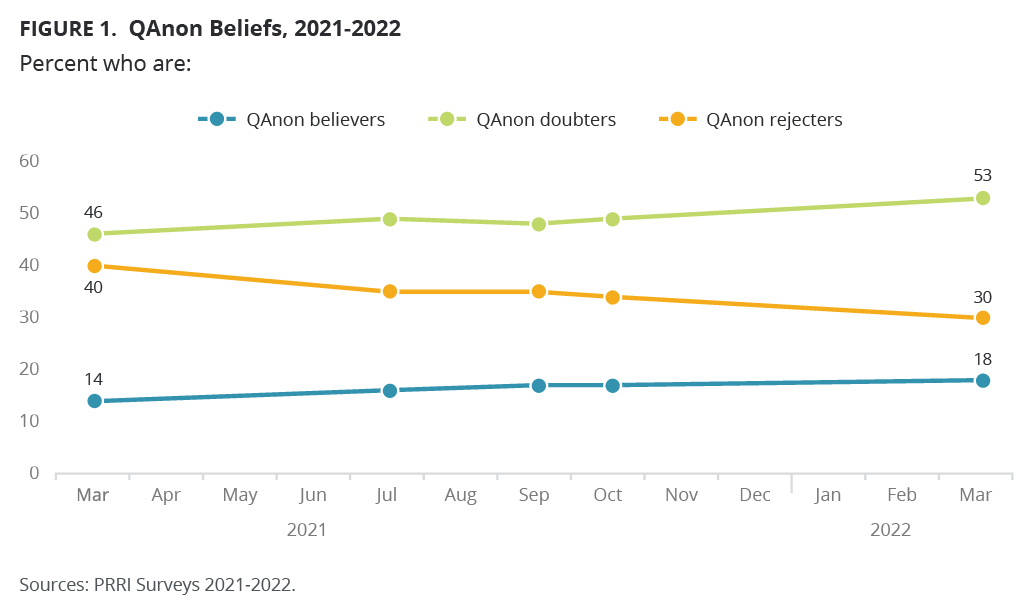
PRRI began tracking a set of three questions beginning in March 2021, measuring agreement or disagreement (completely agree, mostly agree, mostly disagree, or completely disagree) with foundational QAnon beliefs:[1]
- The government, media, and financial worlds in the U.S. are controlled by a group of Satan-worshipping pedophiles who run a global child sex trafficking operation.
- There is a storm coming soon that will sweep away the elites in power and restore the rightful leaders.
- Because things have gotten so far off track, true American patriots may have to resort to violence in order to save our country.
To assess overall belief in QAnon, PRRI tracks a composite measure from these three questions to group Americans into three key groups:
QAnon believers: Respondents who generally agree with these statements.
QAnon doubters: Respondents who mostly disagree with these statements.
QAnon rejecters: Respondents who completely disagree with all three statements.
Looking at the individual questions, currently, 27% of Americans agree that a storm is coming that will sweep away elites in power, 19% agree that violence may be necessary to save the country, and 18% agree that the government, media, and financial worlds are controlled by Satan-worshipping pedophiles.
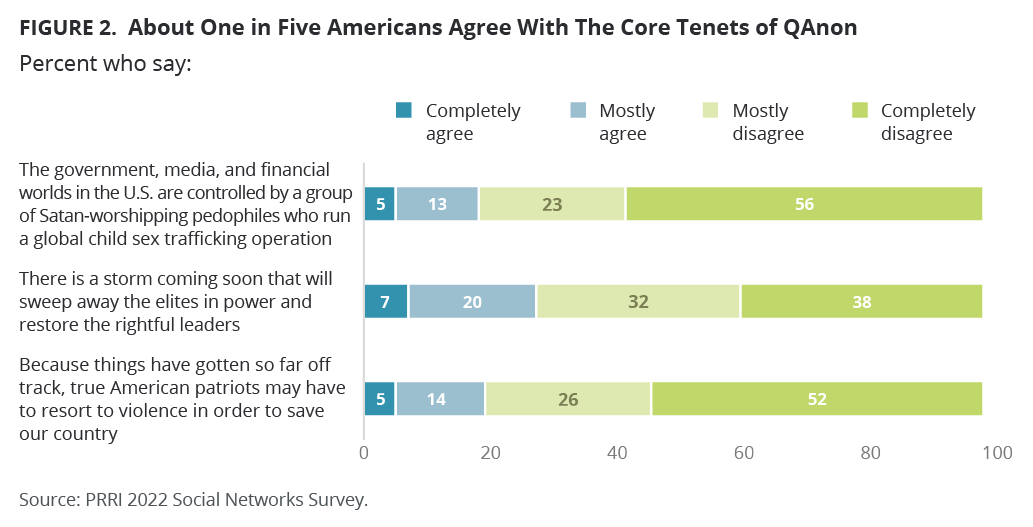
The largest shifts in QAnon beliefs since March 2021 have been in the varying degrees of disagreement with the statement that “There is a storm coming soon that will sweep away the elites in power and restore the rightful leaders.” In March 2021, 6% of Americans completely agreed with the statement, 14% somewhat agreed, 27% somewhat disagreed, and 50% completely disagreed. Currently, 7% completely agree, 20% somewhat agree, 32% somewhat disagree, and 38% completely disagree. This pattern of declining shares of Americans who completely disagree with the other two QAnon statements is similar, but less pronounced.
QAnon Beliefs by Party Affiliation, Media Trust, and Religious Affiliation
Interestingly, the decline in the share of QAnon rejecters have taken place across the party spectrum. The share of Republican QAnon rejecters has decreased from 21% in March 2021 to 12% currently, the independent share has decreased from 40% to 30%, and the Democratic share has decreased from 58% to 45%.
QAnon beliefs remain most prevalent among Republicans (26% are believers), compared to fewer independents (16%) and Democrats (10%). The share of QAnon doubters has grown among all partisan groups since March 2021: from 55% to 62% among Republicans, from 48% to 55% among independents, and from 35% to 45% among Democrats.
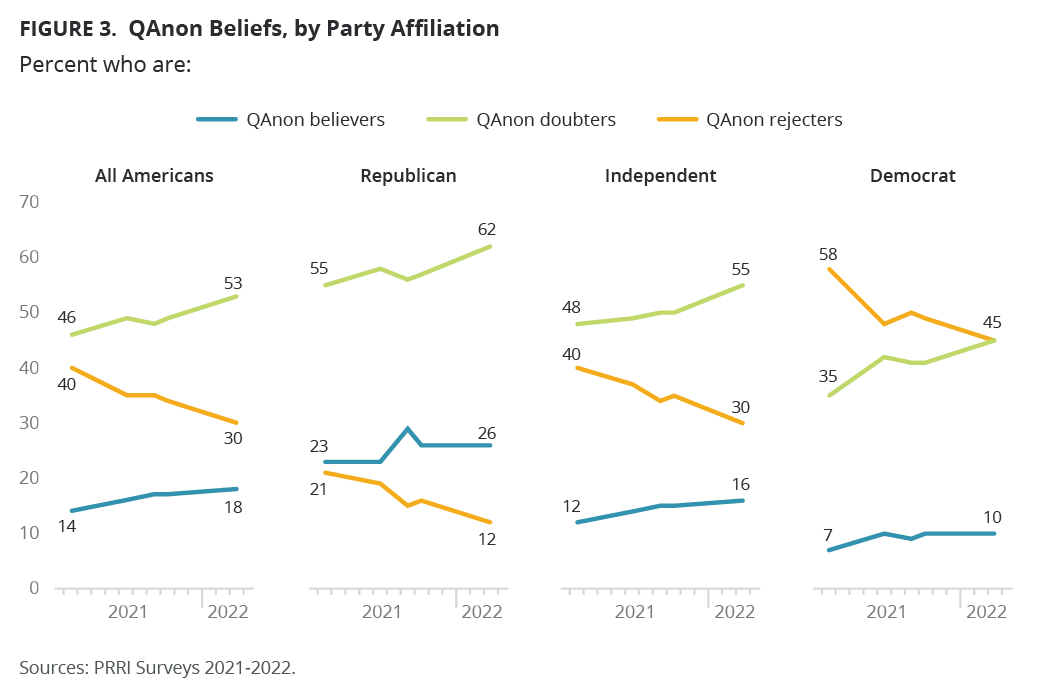
Conservative Americans, particularly those who most trust far-right media outlets like One American News Network (OANN) or Newsmax (38%), are most likely to be QAnon believers. Around one quarter of Americans who most trust Fox News (27%), white evangelical Protestants (27%), other Christians (27%), those with a high school diploma or less formal education (27%), and Republicans (26%), are QAnon believers.
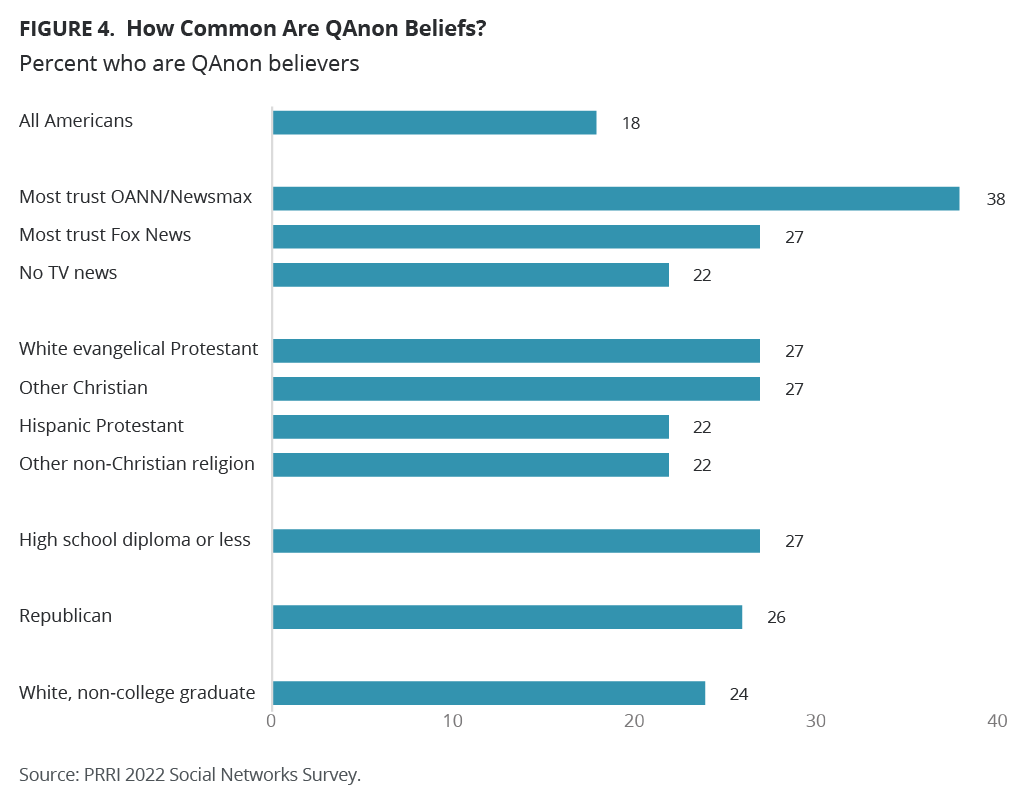
Links to Christian Nationalism
Many QAnon believers express strong Christian nationalist beliefs. Seven in ten QAnon believers (71%) agree with the statement that “God has granted America a special role in human history,” compared to half (49%) of doubters, and 15% of rejecters.
When asked to put themselves on a scale where one end is the statement, “I would prefer the U.S. to be a nation made up of people belonging to a wide variety of religions,” and the other end is the statement, “I would prefer the U.S. to be a nation primarily made up of people who follow the Christian faith,” three in ten QAnon believers (28%) mostly agree that the United States should be a diverse country made up of people of a variety of faiths, compared to 44% of QAnon doubters, and 73% of QAnon rejecters. Around one-third of believers (31%) mostly agree that they would prefer the country to be made up of Christians, compared to 20% of doubters, and just 7% of rejecters. About four in ten believers (39%) place themselves in the middle of the scale, compared to 35% of doubters, and 19% of rejecters.
Additionally, a majority of QAnon believers say that believing in God (71%) or being a Christian (55%) are at least somewhat important to being a “true American.” QAnon doubters (55% and 40%, respectively) and QAnon rejecters (25% and 16%, respectively) are significantly less likely to say that believing in God or being a Christian are important to being American.
QAnon and Cultural Threats
QAnon believers broadly feel a sense of cultural threat on a variety of issues. Nearly two-thirds of QAnon believers (64%) say that American culture and way of life have mostly changed for the worse since the 1950s, compared to 54% of QAnon doubters, and 34% of QAnon rejecters.
Additionally, two-thirds of QAnon believers (65%) agree that being born in America is at least somewhat important to being “truly American,” and 88% say the same about being able to speak English. QAnon doubters (48%) and rejecters (24%) are much less likely than believers to say being born in America is important. However, doubters (84%) are similarly likely to believers to say being able to speak English is important to being truly American, along with 61% of rejecters.
More than one-third of believers (35%), compared to fewer than two in ten doubters (16%) or rejecters (6%), say that being of western European heritage is important to being truly American. When asked to put themselves on a scale where one end is the statement, “I would prefer the U.S. to be made up of people from all over the world,” and the other end is the statement, “I would prefer the U.S. to be a nation primarily made up of people of Western European heritage,” just 38% of QAnon believers, compared to 55% of doubters and 79% of rejecters mostly agree that the United States should be a diverse country made up of people from all over the world. Just under half of QAnon believers place themselves near the middle of the scale (46%), compared to fewer doubters (37%) or rejecters (18%). More than one in ten QAnon believers (14%), compared to 7% of doubters and 3% of rejecters, mostly agree that the United States should be made up primarily of people of western European heritage.
A majority of QAnon believers (55%) favor banning books that discuss LGBTQ topics from being taught in schools, compared to significantly fewer doubters (36%) or believers (13%). QAnon believers (21%) are also more likely than doubters (9%) or rejecters (3%) to favor banning books that include depictions of slavery from being taught in public schools.
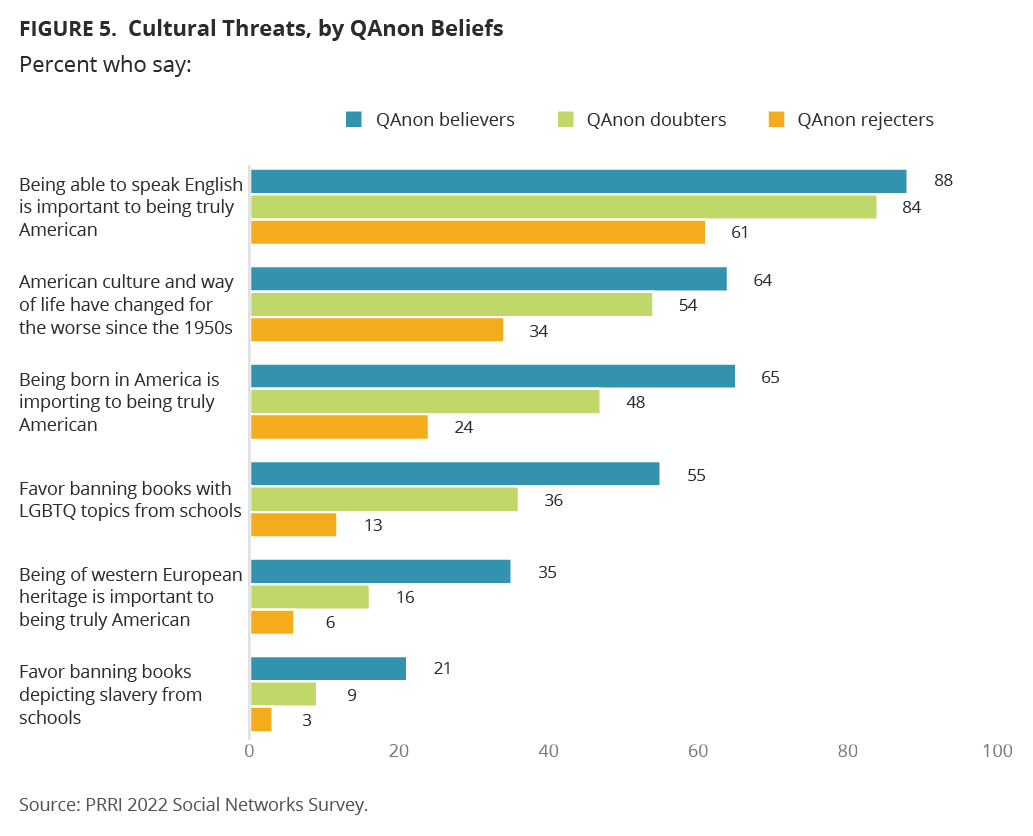
The Social Networks of QAnon Believers
This survey included an extensive series of questions about respondents’ social networks. Respondents were asked to name people with whom they “discussed important matters” in the previous six months, regardless of the nature of the relationship or the frequency of interaction.
Survey respondents were asked to list up to seven people with whom they discuss important issues. Americans overall reported an average social network of 4.2 people. The average network size of QAnon believers (4.1) only differs slightly from doubters (4.2) or rejecters (4.4). However, QAnon believers are slightly more likely to list no one in their network (12%) than doubters (9%) or rejecters (7%). Three in ten QAnon believers (28%), doubters (30%), and rejecters (30%) list between one and three contacts. QAnon believers (60%), doubters (61%), and rejecters (62%) are similarly likely to list four or more contacts.
QAnon believers are slightly more likely on average to list non-family members as their close contacts (2.2) than they are to list family members (1.9). Similarly, rejecters list an average of 2.3 non-family members compared to 2.0 family members. Doubters are just as likely to list family members (2.1) as non-family members (2.1).
By and large, the demographic composition of the social networks of QAnon believers is similar to those of all Americans. The main exception is in the political composition of social networks: QAnon believers are less likely to have networks comprised solely of Democrats (6%), compared to doubters (10%), or rejecters (16%), and are correspondingly more likely to have a network made up of only Republicans (17%), compared to 11% of doubters and 4% of rejecters.
QAnon believers tend to have social circles that have more overlap and geographic proximity than doubters or rejecters. Believers are more likely to report that all or most of the people they listed in their social networks regularly talk to each other (64%), compared to fewer doubters (56%) and rejecters (52%). More than two-thirds of believers say all or most of the people listed in their networks live within a two-hour drive (69%), compared to a similar share of doubters (68%), but slightly fewer rejecters (63%).
More than one-third of QAnon believers say that they talk about politics with all or most of their social network (37%), compared to a similar share of doubters (39%), and a larger share of rejecters (47%). Interestingly, QAnon believers (22%) are more likely than doubters (11%) or rejecters (6%) to say they talk about politics with no one in their social networks.
QAnon believers (37%) are more likely than doubters (28%) or rejecters (20%) to say they talk about religion with all or most of the contacts in their network.
QAnon believers (31%) are slightly more likely than doubters (26%) and significantly more likely than rejecters (19%) to say they own a gun. Furthermore, 31% of believers, compared to 21% of doubters and 10% of rejecters, say that most or all of the contacts in their social network own guns. Just 29% of QAnon believers say that no one in their networks own a gun, compared to 39% of believers and 46% of rejecters. Among QAnon believers who are gun owners, a majority (57%) report that most or all members of their social networks are also gun owners, similar to the share of doubters who are gun owners (53%), and larger than the share of rejecters who are gun owners who say most or all of the people in their networks are gun owners (33%).
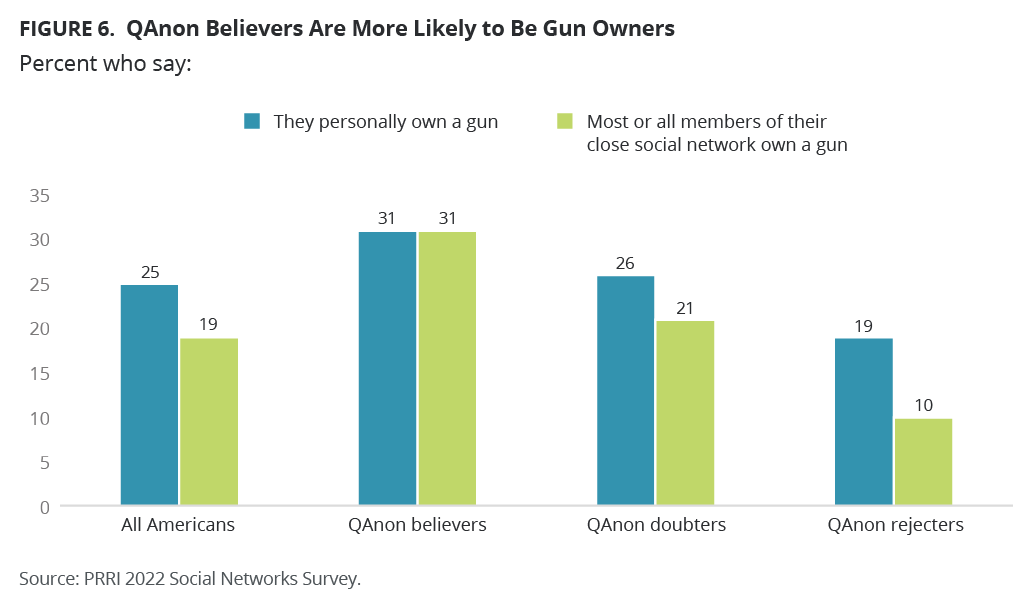
[1]Agree-disagree questions can sometimes have “acquiescence” bias due to a tendency for people to be agreeable in surveys. However, these specific questions are likely more robust due to their extreme content and are generally consistent with other estimates of believing in these conspiracy theories.



